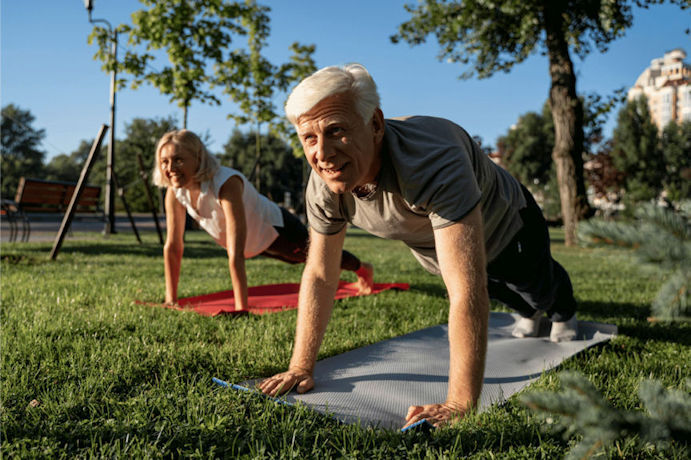Seniors can take advantage of the warm weather by moving their exercise routine from indoors to outdoors. Exercising outdoors has additional benefits, like increasing Vitamin D levels, which is important for bone health and immune function, as well as improving mood, lowering stress levels, and boosting brain function. Exercising during the summer is important to maintain your fitness levels, and taking precautions against heat and sun exposure can help keep you safe. Here are five summer-safe exercise tips for seniors.
- Time Your Exercise
Avoid the heat of the midday sun by exercising in the morning or evening hours. Exercising early in the morning, between 5 am and 8 am, typically offers better air quality, lower pollution levels, and cooler temperatures. Early exposure to sunlight and exercise are also healthy parts of a morning routine, helping to boost metabolism and set a positive tone for the day. Alternatively, light exercise in the evening can help you unwind and relax. Exercising in the evening also helps to reduce sun exposure, with cooler temperatures typically found between 7 pm and 9 pm. For safety reasons, consider finishing your outdoor activities before it gets dark. Avoid exercising outdoors during extreme heat, high humidity, or poor air quality. In these instances, move your exercise routine indoors. Timing your workouts around peak sun and temperature times and considering air quality can help you exercise safely in the summer.
- Build A Safe Exercise Program
Safe exercise tips for seniors include acclimating your body by starting slow and gradually increasing the intensity and duration over several weeks. Include a light warm-up to prepare your body for exercise and a cool-down at the end. A warm-up routine can involve light walking, arm or leg exercises, or any other gentle movements to get your blood circulating. Pay attention to how your body feels as you start exercising, keeping the intensity at a level that feels manageable and comfortable. At the end of your workout, cool down properly in a shaded area with a light walk or stretching. This helps to bring your body temperature and heart rate back to normal and reduces the risk of injury. Consider using a small fan or wet towel to assist with the cool-down process.
- Stay Hydrated
Maintaining hydration is crucial for a summer-safe exercise program for seniors, given the age-related changes that increase the risk of dehydration. It is recommended to drink water or water-based drinks high in electrolytes before, during, and after exercise. Aim to drink at least one cup of water while exercising, and increase the amount if you are exercising more intensely or feeling thirsty at any time. Drinking water before and after exercise helps to ensure that your body stays hydrated throughout the day.
- Listen to Your Body
Reduce the intensity or take a rest break if you start feeling overheated or tired while exercising. Symptoms such as dizziness, nausea, headache, or excessive sweating could indicate something more serious, at which point you should stop immediately, find a shaded spot, and hydrate. Staying hydrated is essential for safe summer exercise and is especially important when you feel thirsty.
- Wear Appropriate Clothing
Wearing light-colored, loose-fitting clothing is recommended for safely exercising in the summer. This allows sweat to evaporate and helps keep you cool during and after exercise. Protect yourself by wearing sunglasses, sunscreen, and a hat. If you are sweating, reapply sunscreen every two hours for adequate protection. Wearing close-toed, supportive shoes is also recommended to ensure safety while exercising outdoors.
Following these summer-safe exercise tips for seniors can help you maintain your fitness levels, which is a key component of healthy aging. At Rothkoff Law Group, we have a team of legal and health professionals ready to help you address your current needs and plan for the future. Reach out today and learn how Rothkoff Law Group can assist you and your loved ones.


